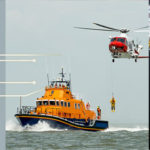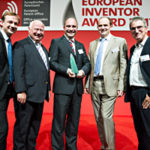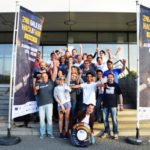
Monthly Archives: June 2017
Winners of the European Inventor Award 2017 – Radio signals for better satellite navigation

A European team, led by French engineer Laurent Lestarquit and his Spanish colleague José Ángel Ávila Rodríguez and including German Günter Hein and Belgian Lionel Ries, has a unique specialism: sending clear signals from space. A virtual cacophony of radio frequencies is sent down to earth from the more than 50 navigation positioning satellites currently in orbit – including those of the US-led Global Positioning System (GPS), Russia’s Global Navigation Satellite System (GLONASS) and more recently Europe’s Galileo system. This team has helped ensure that signals do not interfere with each other, and that users and developers alike will be able to profit from the next-generation positioning technology that Galileo offers.
The team’s contribution of modulation and spread-spectrum signal technologies forms one of the joint European satellite positioning system’s core components, delivering signals that enhance accuracy, save on satellite power and ensure interoperability with GLONASS and the current GPS and its possible upgrades. Read more…
Safewayz, your safety app. Winner of Hackathon 2017

By Angelica Ferrer*:
The primary purpose of the app is a safety app that lets someone send an emergency request for police, fire, or ambulance directly into their system bypassing human intervention saving critical minutes in emergency response. A secondary feature of the app is a crowd-sourced safety map that lets users tag/identify safety hazards and ultimately will draw on open source prime data and provide a safe foot path, allow people who are not necessarily driving to avoid trouble. Read more…
Hackathon 2017 expands Galileo community

As part of its effort to achieve the highest return on European GNSS investment, in terms of benefits to users and economic growth and competitiveness, the GSA has worked very hard to get Galileo into smartphones. It’s an effort that has paid off. Read more…
Webinar – Galileo and the future of SatNav
Today’s Global Navigation Satellite System (GNSS) market is huge. Growing demand for precise location information on smartphones and other hardware has seen GNSS technology embedded in 5 billion devices around the world – a figure that is expected to grow to 8 billion by 2020.
In this Webinar, “Galileo and the future of SatNav: drones, smart cities and self-driving cars” (June 13, 5pm CET), the GSA (European Global Navigation Satellite Systems Agency) will review the market – revealing findings from the latest edition of the GSA’s GNSS Market Report – and provide insight on global trends and future developments. In particular, the webinar will explore: Read more…
Galileo signal team nominated for invention award

The team is led by Spanish engineer José Ángel Ávila Rodríguez – now part of ESA’s Galileo team – and his French colleague Laurent Lestarquit from France’s CNES space agency.
The team also includes German Günter Hein, formerly head of the department studying the evolution of EGNOS and Galileo for ESA, as well as Belgian Engineer Lionel Ries, now in ESA’s technical directorate, as well as French CNES engineer Jean-Luc Issler. Read more…
Galileo helps cities mobility company expand

In Barcelona, this challenge is being answered in part by MOTIT – a unique, electric scooter sharing service that lets users pick up and drop off vehicles wherever and whenever they want. After reserving a scooter via their smartphone, the user receives a notification showing the location of the assigned vehicle. Read more…
